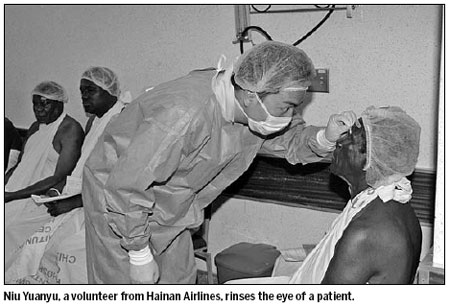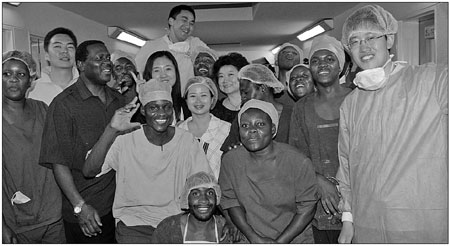Seeing life's bright side
|
Volunteers from Hainan Airlines pose with Zimbabwean medical staff during a break from the China-Africa Brightness charity project that treated more than 500 Zimbabwean cataract patients. Photos by Huang Yiming / China Daily |


Volunteers from Hainan Airlines, who joined a charity project in Zimbabwe, transcend limitations of language and culture to reach out to those suffering from cataracts. Raymond Zhou and Huang Yiming report.
When Jenny Kangoma opened her eyes, she did not see the person she most wanted to see. Zhu Siquan, the ophthalmologist who extracted her cataract and placed a synthetic lens inside her eye, was already on the other side of the room, operating on the next patient.
The first clear image 76-year-old Kangoma saw in five years was that of a group of Chinese in full medical gear, yet they were not from the medical profession. They were volunteers from Hainan Airlines.
"She must have thought she had been transported to China," Zhu joked.
In the small operating room in Chitungwiza Central Hospital, some 40 km south of Harare, capital of Zimbabwe, doctors from Tongren Hospital of Beijing were giving free treatment to patients suffering from cataracts. From March 19 to 24, Zhu operated on 500 patients. But he was surrounded by a band of unsung heroes - nurses and volunteers.
"I never thought Dr Zhu would be able to treat so many patients in one day," says Chen Gang, one of the volunteers from Hainan Airlines. "My grandpa had his cataract removed four or five years ago, and the operation took more than an hour."
That was because Chen's grandfather underwent conventional surgery while Dr Zhu uses a more advanced technique that takes just 2-3 minutes for each patient. Tongren Hospital also uses the most advanced lenses, the kind usually not covered by insurance even in Western countries.
Chen was first given tasks outside the operating room, but given his physique - he weighs 110 kg - he was transferred to the inner room where he helped patients onto the operating table. "Some of them are quite burly," he says.
"My girlfriend, who also works for the airline, is an enthusiast for charity projects. But there were only so many slots for this trip. I beat her to a place maybe because I can lift heavy stuff," he says.
Hainan Airlines is one of the sponsors of the 2011 China-Africa Brightness Action, which took Zhu and his colleagues to Zimbabwe. It is the second time in six months the non-governmental group has taken the project to the African country. The first time was in November 2010 when 300 patients were treated (along with 300 more in Malawi). The airline also underwrites similar trips to China's hinterland, where abundant sunlight has produced a higher rate of cataract in less affluent parts of the country.
Wang Ziyuan, like some of his colleagues, had participated only in the domestic project. In Zimbabwe, "we were sweating all over. The rooms had no air-conditioning initially. I was helping with delivering supplies and getting patients off the table. I was truly touched by Dr Zhu's dedication. He worked all day, taking only an hour for lunch and no other breaks. But there was not a hint of complaint from a doctor of his stature, one of the best eye doctors in our country."
Owing to the size of the facility and steady stream of operations, all eight volunteers from the airline worked on alternate days. They were quick to learn. From the way they rinsed the eyes and dilated the pupils before the operation, to the way they verified the lens measurements and moved medical supplies, it was difficult to tell a volunteer from a nurse.
It was also difficult to tell that many had initial discomfort coming face-to-face with cataract patients and their eye secretions. "It was not a beautiful sight to see the eyes of an elderly patient, to say the least," revealed one, but they all overcame their discomfort without showing it.
"Many patients had been waiting for years for such a chance. You could tell how vulnerable and helpless they were," says Niu Yuanyu. "Even though we could not talk with most of them as they do not speak English, I could sense their pain."
One day, a patient was clutching a can of cola but lost it. As he groped for it, Niu located it and found it was empty. "As I put it back into his hand, I couldn't tell what it meant for him - the money he would redeem it for or something else? As my hand touched his, I felt the trembling."
For Li Zhongxu, the journey started with curiosity, but was soon replaced with "a sense of obligation and responsibility" as he gazed at the patients' faces.
"Their wrinkled faces rarely broke into a smile. But when they said 'hello' or 'thank you' in Chinese, I felt it (helping them) was the most worthwhile thing I had ever done."
Li celebrated his 28th birthday on the flight to Zimbabwe, with flight attendants throwing a surprise party for him. "I was so fortunate to be part of this endeavor. It was a most memorable moment."
The experience was also "a great joy" for Zhang Feng. As a college student, he was involved in sports activities for the disabled. "To be able to help others in the China-Africa Brightness trip meant a lot to me. And we made friends with local hospital staff and gained more knowledge about Africa as I pondered China's role in Africa."
The trip was "not as hard as I expected", says Pan Meng, "partly because we had some preconceived notions about Africa that turned out to be wrong."
The brightness project was born out of a personal vision. "My mother suffered from glaucoma," says Wang Jian, CEO of Hainan Airlines. "After she was cured, it dawned on me that I should help bring brightness to more mothers."
The philanthropic project, partnered with Tongren Hospital, was launched in China's Qinghai-Tibet Plateau, where cataract patients number 2 million. "The next step is to expand it to Africa, and then maybe to South America," Wang says.
Wang is averse to the notion of using charity to promote business. "As a businessman, I pursue profits. But when I engage in charity, I must forget about return on investment or name recognition. It is about giving love, as quietly as we can."
Zhang Ruoping has been with the airline for 19 years. She did not have any experience in healthcare. "I used to be a performing arts teacher, and I'm good at enlivening any occasion," she bubbles. Years ago she adopted a 3-day-old girl, most likely abandoned because of a disability.
"I believed I could bring her up because I could give her love." And bring her up she did. Now she is in high school.
Zhang, 47, the only volunteer who is not male and not in her 20s, had plenty of motherly love to pass around. She was seen hugging and shedding tears with local patients and medical staff on the last day of the project and sharing stories through hand gestures.
"I feel welcome here. Deep down, we are all the same and on that level I have no difficulty at all communicating with any of them. When you give your heart, people will know it and it needs no language."
(China Daily 04/06/2011 page20)















